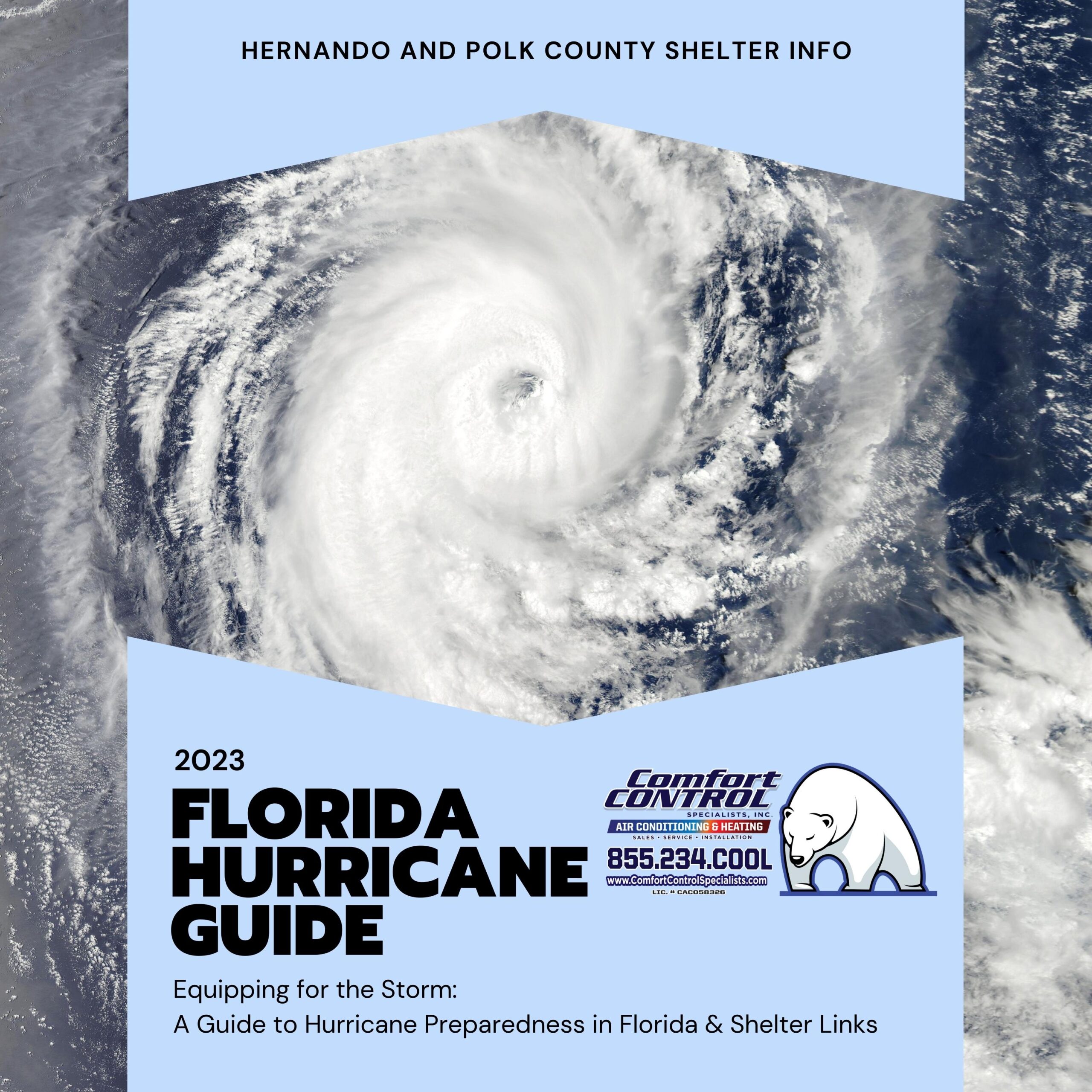[vc_row][vc_column][vc_column_text]As we mark the commencement of the hurricane season this June 1, 2023, it’s crucial for Floridians to not only understand the potential impacts but also brace themselves by thorough preparation. With its geographical location, Florida has long been a hotspot for hurricanes that have left lasting marks on its landscapes and its people. However, equipped with awareness and effective preparation, we can collectively navigate this stormy season.
Florida’s relationship with hurricanes is deeply intertwined with its history. Take Hurricane Andrew of 1992, one of the most catastrophic storms in US history, leaving in its wake an astounding $27.3 billion in damages and sadly claiming 65 lives. Fast forward to 2017, and we witnessed Hurricane Irma sweeping across the state, leaving a trail of $50 billion damages and affecting almost two-thirds of Florida’s residents. These hurricanes serve as stark reminders of the destruction these natural disasters can cause.
The Atlantic Hurricane Season, starting June 1 and stretching till November 30, has always been a period of heightened alert for the state. Statistically, each year sees an average of 12 named storms, with around 6 escalating into hurricanes, and 3 growing into major hurricanes. This underscores the significance of being well-prepared for the hurricane season.
So, let’s delve into the comprehensive steps Floridians can take to effectively prepare for the 2023 hurricane season.
Creating a Comprehensive Disaster Plan
The first step towards hurricane preparedness is creating a detailed disaster plan. This plan should clearly identify safe zones within your home and detail an evacuation plan. The safe zones should be areas that are most shielded from windows and glass doors, typically a small interior room without windows.
In devising an evacuation plan, ensure it includes potential evacuation routes, meeting points, and contingency provisions for possible road closures. Every family member should know this plan, and there should be practice drills to ensure everyone knows what to do. This plan should also account for your pets, ensuring they will have the necessary supplies and care during this period. Remember, in an evacuation scenario, you may need to leave quickly, so have a go-bag ready with essentials.
Preparing an Emergency Kit
An emergency kit is an essential component of hurricane preparedness. This kit should be well-stocked and ready to go at a moment’s notice. It should contain:
- Water and Food: At least a gallon of water per person per day for a minimum of three days, and non-perishable food for the same duration.
- First Aid Supplies: A basic first aid kit with bandages, antiseptic wipes, tweezers, medical tape, and gloves.
- Medications: A seven-day supply of necessary prescription medicines, along with copies of your prescriptions.
- Important Documents: Copies of your identification, insurance policies, and other vital documents in a waterproof container.
- Light Sources: Flashlights, headlamps, and extra batteries. Avoid candles due to the risk of fire.
- Cash: ATMs and credit card machines may not be functional after a hurricane.
- Sanitation items: Include hand sanitizer, wet wipes, and plastic garbage bags.
- Communication devices: Battery-powered or hand-crank radio to stay informed. A power bank for your cell phone could be a lifesaver.
- Tools: A multi-tool that includes a knife, a manual can opener for food, and a wrench or pliers to turn off utilities if necessary.
- Special Needs Items: Baby supplies, pet food, or any other specific family needs.
Securing Your Home
Securing your home is a critical aspect of hurricane preparedness. There are several steps to take to ensure your home is as safe as possible.
- Hurricane Shutters and Impact-Resistant Windows: These are specifically designed to withstand the force of hurricanes and can significantly reduce the damage to your home. If these are not feasible, you can use marine plywood as an alternative to board up your windows.
- Secure Doors: Exterior doors should be hurricane-proof and have at least three hinges and a deadbolt lock that is one-inch long minimum. Garage doors can be reinforced with braces or retrofit kits.
- Roof Checks: Ensure your roof is in good condition and secure any loose tiles or shingles.
- Gutters and Downspouts: Clean your gutters and downspouts to prevent water damage from backed-up rainwater.
- Outdoor Items: Secure or bring inside any outdoor furniture, decorations, garbage cans, and other items that could become projectiles in high winds.
- Trees and Landscaping: Regularly trim trees and shrubs around your home to minimize the risk of broken branches causing damage.
Understanding and Updating Your Insurance Coverage
Review your insurance policies to understand what is and isn’t covered. Standard homeowner’s insurance policies don’t typically cover flood damage, which is one of the most common types of damage in hurricanes. If you don’t already have flood insurance, consider adding it. Keep in mind that there’s usually a 30-day waiting period for new flood insurance policies to take effect. Document your belongings with photos or a video tour of your home, which can help if you need to file an insurance claim.
Staying Informed and Updated
Staying informed before, during, and after a hurricane is crucial. Follow the National Hurricane Center and local government sources for official updates and instructions. There are numerous apps and websites available that provide real-time weather updates, emergency alerts, and other vital information. Social media can also be a valuable source of information, but ensure the information is from reliable and official sources.
Source: Tampa Bay 10
Community Involvement
Getting involved in community preparation can go a long way in ensuring neighborhood safety. Participate in community emergency response training programs and share resources and information with your neighbors. Communities that work together during these times can dramatically increase their resilience.
As Benjamin Franklin wisely said, “By failing to prepare, you are preparing to fail.” Florida’s hurricane season is undoubtedly a formidable adversary, but with thorough preparation, we can fortify our homes and communities to withstand the storm. Remember, the objective is not just to survive, but to recover and thrive after the storm has passed. As we embark on this hurricane season of 2023, let’s ensure our readiness reflects our resolve, and let’s brave the storm together, Florida!
Keywords: Florida, hurricane season, prepare for hurricane, disaster plan, emergency kit, secure your home, insurance, stay informed, Hurricane Andrew, Hurricane Irma, Atlantic Hurricane Season, National Hurricane Center.
Preparing Your Vehicle
It’s not just your home that needs preparing – your vehicle does too. Ensure your vehicle is in good working condition and your fuel tank is full, as gas stations may not be operational during a hurricane. Additionally, keep an emergency kit in your car, containing things like jumper cables, a tire repair kit, and a can of tire inflator and sealer.
Maintaining Mental and Physical Health
Hurricane preparedness isn’t only about securing property—it’s also about looking after your physical and mental health. Ensure you have a supply of any prescription medication, and consider activities to relieve stress and anxiety, especially for children. Maintain a balanced diet and stay hydrated to keep your energy levels up.
After the Storm: Recovery and Rebuilding
Once the storm has passed, recovery and rebuilding begin. Be cautious when returning home and cleaning up. Beware of hazards like downed power lines, leaking gas, structural damage, contaminated water, and displaced wildlife.
Take photographs of any damage for insurance purposes, and file your claims as soon as possible. Remember, recovery takes time, and it’s important to look after your mental health during this period. Access any available community resources, and don’t hesitate to ask for help.
Final Thoughts
Florida’s hurricane season requires the community to be alert, aware, and prepared. By implementing the strategies outlined in this comprehensive guide, you can not only protect yourself, your family, and your property but also contribute to the resilience of your broader community.
Although it’s impossible to prevent hurricanes, preparedness can significantly mitigate their impact. The right preparation enables rapid recovery and a return to normalcy. As we face the 2023 hurricane season, let’s meet it with confidence, knowing we are equipped and ready for whatever it may bring.
Stay safe, Florida! Together, we can weather any storm.
Local Shelter Resources
- Hernando County (Spring Hill, Brooksville, Weeki Wachee) – https://www.hernandocounty.us/departments/departments-a-e/emergency-management/shelter-information
- Lakeland – https://www.lakelandgov.net/departments/lakeland-fire-department/safety/hurricane-information/
- Polk County – Site Currently Down but coming soon.
If you live in Odessa, Keystone, Spring Hill, Tarpon Springs, Land O Lakes, Oldsmar, Brooksville, or the surrounding areas, and need help ensuring your HVAC is properly prepped for Hurricane Season, please don’t hesitate to contact the Comfort Control Specialists or call us 1-855-234-2665.[/vc_column_text][/vc_column][/vc_row]



